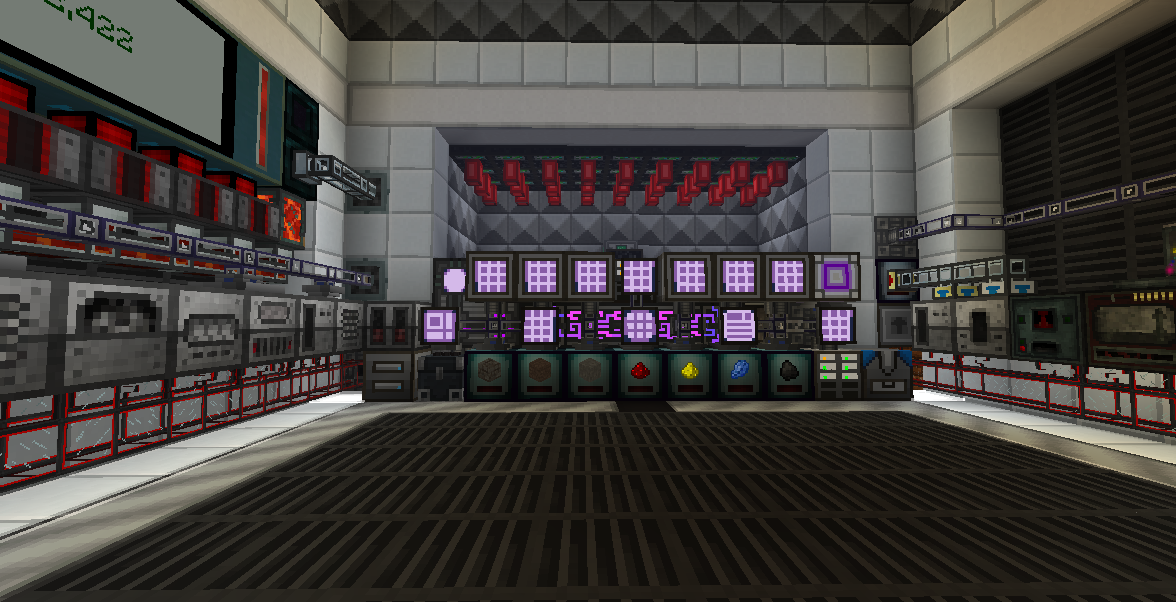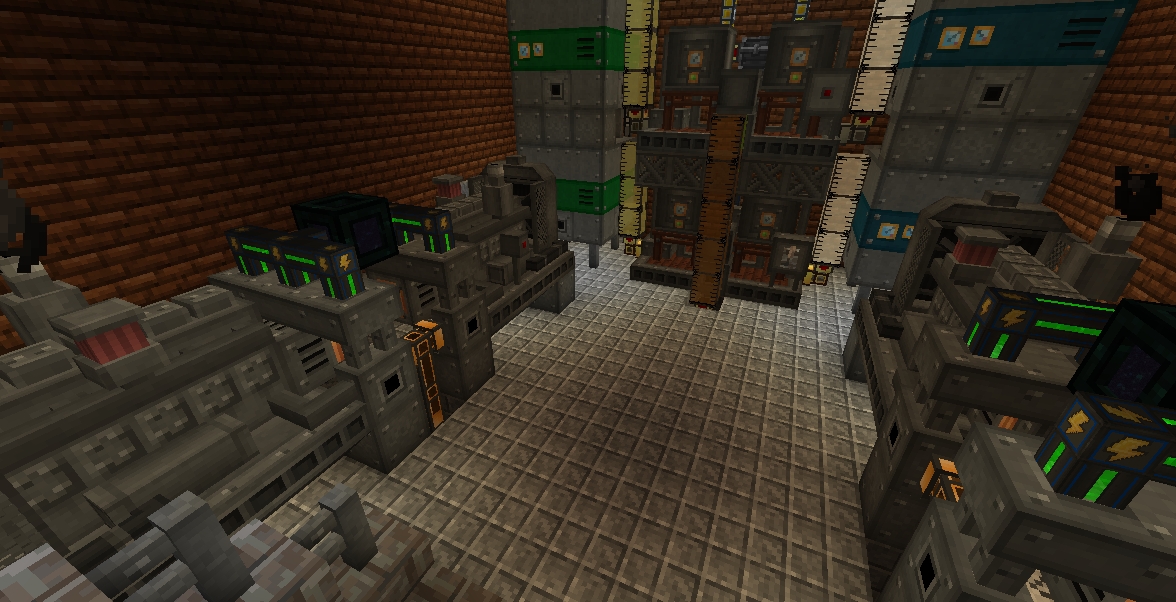I think I asked this in another thread, and it got buried/lost. It's worth a thread itself.
Why do tech mods feel a need for a power system?
===
Vanilla uses fuel for the furnace. After that, it's just a matter of time -- furnaces take X ticks per operation if the fuel is there, potions take X ticks regardless, teleporting (nether portals) takes time, etc.
But there's no real concept of power. Strength 1, and strength 15, redstone works identically. Power rails that are close to the redstone torch are just as "accelerating" as power rails some distance from the redstone torch.
===
Why does a squeezer require power, instead of just time? Hoppers will process their input as a matter of time; dispensers and droppers just require a simple redstone loop if you don't mind the sound effects, and a comparator will minimize that.
Why does a gene manipulator require power, instead of just lots of time? Why does it require lots of time?
Well, you could say that genetic manipulation and centrifuges so that you can trivially get lots of materials should not be so trivial. And that power systems are supposed to be the limiting factor. And that makes sense.
But if power is supposed to be a "You are limited in using some advanced machines", why is that not the whole design of the power system from step 0?
===
There are many things that could be done to tweak a power system; the supply can have 1 or 2 factors, the machines can require certain strength of power, storage devices could be next to the machines, or built-in to the machines, etc. Power cables might have tiers and limited transmission and loss; combining might require some kind of power matching, or they might just add freely.
If you approach the view of a power system from the view of "The power system has the job/goal of limiting access to advanced machine Y until X is done", how/why/what determines the X? And, to what extent does the challenge depend on, versus define, the power system structure?
Extreme view #1: All machines are equal, all power is equal, all generators are equal; the only difference is size. One gigantic generator, or lots of little generators, everything else is indifferent. All storage devices are perfect and lossless; all machines come with built-in power cells that render explicit batteries useless most of the time. No challenge or restriction beyond the resources to run the devices, and even that can be automated so that only the setup is the delay/cost.
In such a setup, the only real way to make something be slowed down by the tech system is to require crazy huge power demands. Which just results in people asking for crazy huge power generators, which in turn just requires adding some very rare, hard to acquire resource for building or fuel.
In the extreme, mining for the rare ores needed to run the high-end generators becomes a game in itself.
Extreme view #2: Power is defined by two different characteristics (example: voltage and amps; speed and strength). Two different power sources with different characteristics cannot be combines; all conversions to match characteristics have loss. Advanced power generators do not just take fuel to run. They take power to run, and need those lower-end generators to make them happy (to power their control circuits, etc). They require special items in their construction, and those items need power to build. All transmissions have loss (wires have resistance, etc), all storage has loss. No machine has built-in batteries, so explicit power storage is needed.
In such a setup, a machine might not have excessive total power requirements; it might have heavily lopsided power requirents. For example, most generators might have a common characteristic of high speed and low strength; "better" machines might have higher strength requirements. The conversions would imply loss, so better converters with less loss would be better, and might require rarer parts, or parts made by higher-quality machines.
In the extreme, getting the power supply needed would be a game in and of itself.
===
Thoughts? Anything I missed? Anyone see flaws with my thinking? Anyone have a better answer to the question, "Why have a power system anyways?"?
Why do tech mods feel a need for a power system?
===
Vanilla uses fuel for the furnace. After that, it's just a matter of time -- furnaces take X ticks per operation if the fuel is there, potions take X ticks regardless, teleporting (nether portals) takes time, etc.
But there's no real concept of power. Strength 1, and strength 15, redstone works identically. Power rails that are close to the redstone torch are just as "accelerating" as power rails some distance from the redstone torch.
===
Why does a squeezer require power, instead of just time? Hoppers will process their input as a matter of time; dispensers and droppers just require a simple redstone loop if you don't mind the sound effects, and a comparator will minimize that.
Why does a gene manipulator require power, instead of just lots of time? Why does it require lots of time?
Well, you could say that genetic manipulation and centrifuges so that you can trivially get lots of materials should not be so trivial. And that power systems are supposed to be the limiting factor. And that makes sense.
But if power is supposed to be a "You are limited in using some advanced machines", why is that not the whole design of the power system from step 0?
===
There are many things that could be done to tweak a power system; the supply can have 1 or 2 factors, the machines can require certain strength of power, storage devices could be next to the machines, or built-in to the machines, etc. Power cables might have tiers and limited transmission and loss; combining might require some kind of power matching, or they might just add freely.
If you approach the view of a power system from the view of "The power system has the job/goal of limiting access to advanced machine Y until X is done", how/why/what determines the X? And, to what extent does the challenge depend on, versus define, the power system structure?
Extreme view #1: All machines are equal, all power is equal, all generators are equal; the only difference is size. One gigantic generator, or lots of little generators, everything else is indifferent. All storage devices are perfect and lossless; all machines come with built-in power cells that render explicit batteries useless most of the time. No challenge or restriction beyond the resources to run the devices, and even that can be automated so that only the setup is the delay/cost.
In such a setup, the only real way to make something be slowed down by the tech system is to require crazy huge power demands. Which just results in people asking for crazy huge power generators, which in turn just requires adding some very rare, hard to acquire resource for building or fuel.
In the extreme, mining for the rare ores needed to run the high-end generators becomes a game in itself.
Extreme view #2: Power is defined by two different characteristics (example: voltage and amps; speed and strength). Two different power sources with different characteristics cannot be combines; all conversions to match characteristics have loss. Advanced power generators do not just take fuel to run. They take power to run, and need those lower-end generators to make them happy (to power their control circuits, etc). They require special items in their construction, and those items need power to build. All transmissions have loss (wires have resistance, etc), all storage has loss. No machine has built-in batteries, so explicit power storage is needed.
In such a setup, a machine might not have excessive total power requirements; it might have heavily lopsided power requirents. For example, most generators might have a common characteristic of high speed and low strength; "better" machines might have higher strength requirements. The conversions would imply loss, so better converters with less loss would be better, and might require rarer parts, or parts made by higher-quality machines.
In the extreme, getting the power supply needed would be a game in and of itself.
===
Thoughts? Anything I missed? Anyone see flaws with my thinking? Anyone have a better answer to the question, "Why have a power system anyways?"?

